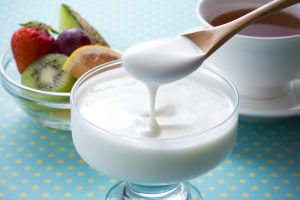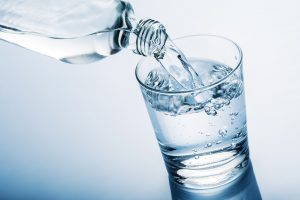 Do you get cramps in your side after eating certain foods? Do you feel bloated, gassy, or suffer from constipation? If so, then you may have an imbalance in your gut bacteria. Probiotics may be able to help you improve your digestive health.
Do you get cramps in your side after eating certain foods? Do you feel bloated, gassy, or suffer from constipation? If so, then you may have an imbalance in your gut bacteria. Probiotics may be able to help you improve your digestive health.
What are probiotics?
Probiotics are live bacteria strains found in fermented foods or in supplement form. They help to balance levels of good as well as bad bacteria in the gut. Examples of fermented foods and drinks include:
- yogurt (fermented milk)
- sauerkraut (fermented cabbage)
- kefir (fermented cow’s milk normally consumed as a beverage)
- kombucha (fermented black or green tea)
- miso (paste made from fermented soybeans)
- tempeh (fermented soybeans)
A diverse ecosystem of bacteria in the gut may reduce inflammation in the body. In fact, animal studies show that probiotics could lower levels of inflammation in the body related to such conditions as rheumatoid arthritis and heart disease. However, you should take probiotics on a regular basis for the most health benefit.
If taken in a supplement form, try to get a probiotic with multiple strains of bacteria since each strain provides different benefits. Also, those found in a refrigerated form, such as those found in health food stores, may provide a more potent formula. For example, there is a quality probiotic called Biovia 30X made by Vita Sciences. Biovia 30X contains 30 billion colony forming units (CFUs) in 10 different strains of probiotics.
Other ways to improve gut health
Besides probiotics, there are other ways you can help improve your digestive health with just a few tweaks in your healthy lifestyle.
- Avoid foods that can cause inflammation. Examples of foods to limit in your diet include red meat, high-fat dairy, fried foods, and foods high in additives. Also, processed foods such as sausage and candy that contain advanced glycation end products (AGEs). AGEs should be limited since they can reduce the number of healthy bacteria in the gut.
- Eat more fiber since it helps to feed the healthy bacteria. Fiber-rich foods include fruits, vegetables, and whole grains such as oats, quinoa, brown and wild rice, and bran, to name a few.
- Live a balanced lifestyle. Getting enough sleep, staying active, and staying hydrated is important to keep your gut happy. Most adults should get about 7 to 9 hours of sleep each night to help regulate a healthy blood pressure and healthy blood glucose levels. Also, exercise at least 30 minutes a day for most days of the week. This is because studies show that exercise can help enrich the growth of a diverse population of bacteria in the gut. Finally, when you add in more fiber to your diet, drinking enough water each day is important to lower risk of constipation. Aim for about half of your body weight in ounces. If you are 200 pounds, then this means you should drink about 100 ounces, or 12.5 cups of unsweetened fluid each day.
- Manage stress. Meditation, yoga, relaxation breathing, talking to a counselor, or just finding time each day to relax and do something you enjoy can help lower stress. It is important to manage stress not just to sleep better, but for gut health as well. For example, studies have shown a potential link between the brain and gut health. For example, if you get stressed or depressed, studies show that this could trigger gut health issues.
-written by Staci Gulbin, MS, MEd, RD, LDN
Sources:
Harvard Health Publishing- Harvard Medical School (October 2016) “Can gut bacteria improve your health?”
Harvard Health Publishing- Harvard Medical School (accessed April 3, 2018) “The gut-brain connection.”
Monda, V., Villano, I., Messina, A., Valenzano, A., Esposito, T., Moscatelli, F., … Messina, G. (2017). Exercise Modifies the Gut Microbiota with Positive Health Effects. Oxidative Medicine and Cellular Longevity, 2017, 3831972. http://doi.org/10.1155/2017/3831972
Mayo Clinic (August 20, 2016) “How much should the average adult exercise each day?”
National Sleep Foundation (accessed April 2, 2018) “How Much Sleep Do We Really Need?”
NIH News in Health (May 2017) “Keeping Your Gut in Check: Healthy Options to Stay on Tract.”
Physicians Committee for Responsible Medicine (accessed April 3, 2018) “Healthy Gut: Prebiotics and Probiotics.”
 weigh 150 pounds, then you are suggested to drink 75 ounces, or about 9 and a half cups of fluid a day. Tea, coffee, juice, fluid from fruits and veggies, as well as broths also count towards fluid intake. However, caffeinated drinks such as coffee and cola also act as diuretics since caffeine is a stimulant; therefore these types of fluids can actually dehydrate you if consumed in excess.
weigh 150 pounds, then you are suggested to drink 75 ounces, or about 9 and a half cups of fluid a day. Tea, coffee, juice, fluid from fruits and veggies, as well as broths also count towards fluid intake. However, caffeinated drinks such as coffee and cola also act as diuretics since caffeine is a stimulant; therefore these types of fluids can actually dehydrate you if consumed in excess.